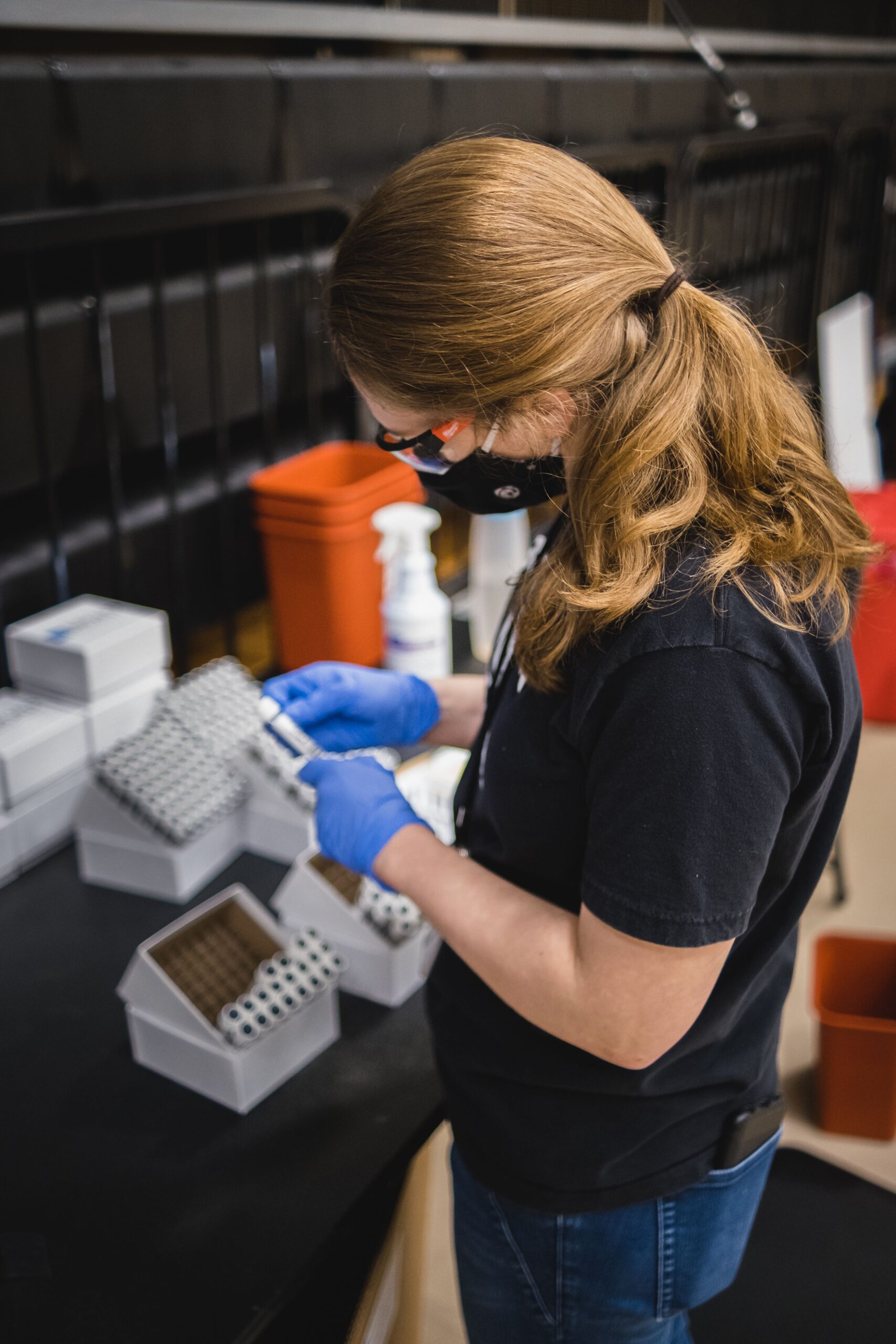College wraps up on-campus testing protocol for the academic year
May 6, 2021
 Cheng Xing
Cheng XingThis academic year has been defined by the measures taken by the Bowdoin community to protect against COVID-19, and the cornerstone of the College’s plan to prevent an outbreak on campus has been a robust testing program. In the fall, the College administered an average of 2,400 tests per week. This semester, that number has increased to 4,500 tests per week. The total expenses associated with the program will exceed $2.6 million for the year.
All these tests are self-administered in Morrell Gymnasium, which has been transformed from a practice and competition site for the College’s varsity basketball programs into the College’s testing hub.
“We built all the [testing] stations you see [in Morrell] in-house to help move people swiftly and safely. We also needed a way to schedule students, because at the time we were afraid of long lines,” COVID-19 Resource Coordinator Mike Ranen said in a Zoom interview with the Orient. “But now, we don’t require students to sign up because lines haven’t been a problem.”
At the end of the day, after all tests have been administered, the vials containing student, faculty and staff samples are driven to the Broad Institute in Cambridge, Mass.
The College, along with more than 100 of its peer institutions in New England, partnered with the Broad Institute to help facilitate regular testing for students, staff and faculty this year. The Institute, which is typically a biomedical and genomic research center, repurposed its facilities to create a rapid COVID-19 testing center at the start of the pandemic. The Institute has been processing tests not only from colleges and universities in the New England area but also from Massachusetts K-12 schools and high-risk communities such as nursing homes.
“I first heard about the Broad Institute through a piece of paper that made it on to my desk, but at that point the partnership was only available for Massachusetts schools. When they finally opened up to schools within a 150-mile radius, we reached out to make a deal,” President Clayton Rose said in a Zoom interview with the Orient.
The Institute charges a standard rate of $25 per test for all participants in the college and university program, a fraction of the typical processing cost, which can be more than $100. Over the course of the year, the College has purchased roughly 105,000 tests, yielding an estimated allocation of $2,625,000 towards the processing of these tests.
“There was no negotiation about price—we were grateful to have an opportunity to participate. The price that Broad was able to offer was some function of 25 percent of what we were seeing on the retail market for PCR testing and at a quicker turnaround time, so, the 24-hour result versus typically a three day wait for other labs that were offering something for the fall,” Senior Vice President for Finance and Administration and Treasurer of the College Matt Orlando said in a Zoom interview with the Orient.
Also available this semester are rapid antigen tests, which are used for campus events such as athletic competitions and theatre rehearsals. These quick-turnaround tests allow close contact for certain activities. For example, actors in last month’s production of “Cows of War” were antigen tested and able to perform without masks.
These tests were only available through Abbott Laboratories, which found itself with a surplus after the Biden administration asked for fewer tests than the Trump administration. This excess was offered to select colleges and universities at a fraction of retail price; the exact number could not be shared with the Orient due to non-disclosure agreements.
“I had made an inquiry last summer with our labs to see if we could order some for the fall, and they were not available,” Orlando said. “After they were made available to higher ed, I quickly purchased them to strengthen our testing protocol and give us more options.”
“Together, the PCR and antigen tests allow us to quickly identify individuals who are carrying the virus and later isolate them. This has allowed us to bring students to campus safely and responsibly,” Rose said in a Zoom interview with the Orient.
As this semester draws to a close, College administrators are evaluating what role testing will play in the fall semester. Orlando is currently designing the budget for the next fiscal year, which could include an allocation for testing on-campus students.
“It’s a real shot in the dark. The key here is [that we will have] a fully vaccinated community,” Orlando said. “Of course, you still want to have the ability to test in case one of the [COVID-19] strains is able to evade a vaccine.”
One idea is pool testing, in which samples from groups of students are combined and analysed together to generally determine if the virus is present on campus.
“[Pool testing] makes a lot of sense in an environment where most of your population is vaccinated,” Orlando said. “You’re not having everyone test two or three times a week, or even once a week—you’re having a percentage of your population test.”

Comments
Before submitting a comment, please review our comment policy. Some key points from the policy: